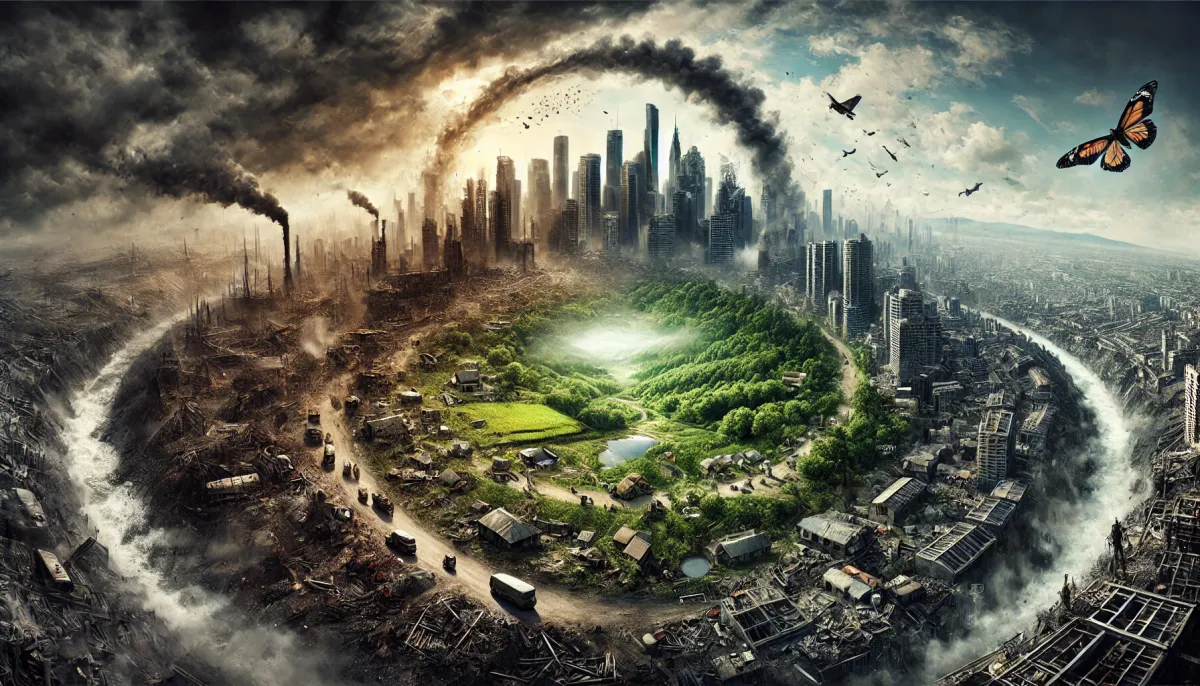The Ashes of Progress (Fiction)

The collapse did not come all at once, though people would say it did in the years that followed. It began in the way a rope begins to fray, a single thread snapping quietly in the night, unnoticed by the hands that pulled it taut. By the time anyone thought to look, the cord was bare and brittle, unraveling faster than anyone could fix. The economy, the markets, the machinery of human ambition—all of it teetered and fell with the gracelessness of a dying ox. And when it hit, it hit hard.
Cities burned. Not in a fiery cataclysm but in the way they’d been burning for years, the flames hidden beneath the sheen of LED screens and rooftop gardens. The real fire came later, after the great unraveling, when desperation turned neighbors into thieves and strangers into enemies. Some fought for survival, others for scraps of a world they no longer understood. When the dust settled, the horizon was bare—fields of ash and concrete, steel skeletons of what once were towers, and rivers black with the runoff of dreams.
For a long time, there was silence. The kind of quiet that sits heavy on the chest, where even the wind seems afraid to move. But humans are a stubborn breed. They crept out of their hiding places—out of the hills, the caves, the basements where they had waited. They began to rebuild.
The first communities were small and harsh. The soft ones didn’t make it; they couldn’t. The people who survived had the kind of grit you couldn’t teach in boardrooms or bureaucracies. They turned scavenged metal into plows, burned the remnants of the old world to stay warm through winters that seemed to stretch forever. They talked about the collapse in whispers, as if naming it might call it back.
But as the decades rolled on, the whispers turned into stories, the stories into legends. The collapse became a myth, a cautionary tale for a generation that had never known the weight of skyscrapers or the hum of power grids. They spoke of the old world in half-truths and contradictions—a time of great promise and great failure, when humans had flown too close to the sun on wings of silicon and greed. The lesson, they said, was clear: Never again.
The new society grew slowly, like ivy reclaiming an abandoned home. It was smaller, decentralized. Decisions were made in town halls, not boardrooms; power was measured in trust, not wealth. People lived closer to the land, to one another. It wasn’t perfect, but it was good enough. For a time.
And then came the factories. Small at first—workshops, really, where people gathered to solve problems and make tools. But necessity bred innovation, and innovation bred ambition. Soon the workshops became centers of trade, then hubs of industry. Someone invented a better loom, another built a waterwheel that could power three villages. Progress had returned, though no one called it that. Not yet.
The first corporation was born quietly, almost innocently. A group of communities pooled resources to build a rail line between towns. It was efficient, practical. But efficiency has its own hunger, and the rails became roads, the roads became networks. Trade flourished, wealth accumulated, and with it came the inevitable stratification. A man with a clever idea became a rich man; a rich man became a powerful one. And though the people swore they would never repeat the mistakes of their ancestors, history has a way of wearing down even the hardest resolve.
By the second century, the new world looked much like the old one. The cities returned, their lights flickering back to life. The air grew thick again with the smell of industry, and the rivers, once clean, ran dark and sluggish. The same machines that had once fed nations now demanded payment in kind, chewing through forests and mountains with an appetite that could not be sated.
The ten largest companies controlled a third of the economy. People whispered about collapse, but no one listened. It wasn’t their problem, not yet. They thought themselves smarter than their ancestors, more prepared, as though knowing the mistakes of the past was the same as avoiding them. They built higher towers, stronger networks. The system grew until it groaned under its own weight.
The rope began to fray.
And when it snapped, they said it came all at once.